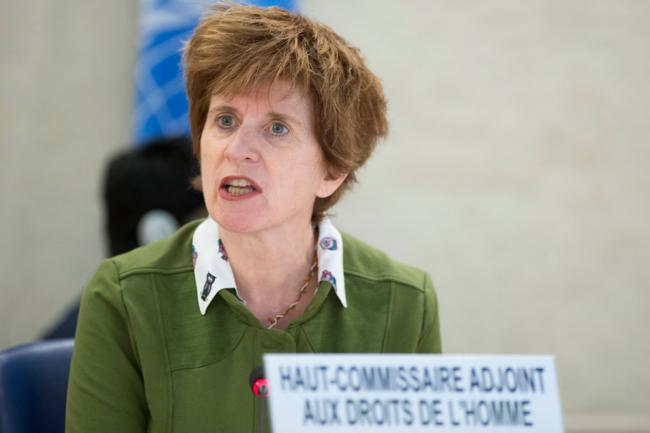
UN Human Rights Council discusses situations in DR Congo, Libya, Ukraine and Burundi
During the dialogues, member countries of the Geneva–based Human Rights Council discuss the human rights situation with delegations from a particular country on the Council’s agenda, as well as other Council members, officials of the Office of the UN High Commissioner for Human Rights (OHCHR), and Special Rapporteurs and Independent Experts.
The dialogue includes a presentation or a briefing by OHCHR officials followed by discussions.
Democratic Republic of the Congo
On the human rights situation in DRC, Kate Gilmore, UN Deputy High Commissioner for Human Rights noted with concern that on 19 and 20 September, at least 53 people, including 49 civilians, had been killed in clashes in capital Kinshasa and said that it was particularly worrying that manifestly excessive and lethal force had been deployed by security forces against crowds.
She noted with further concern that the reports of journalists and photographers being rounded up prior to those incidents were deeply disturbing, and stressed that a large-scale crisis could be looming. As such, she urged all actors to pursue a resolution to the situation.
Gilmore also called on the Council to augment its scrutiny of the human rights situation in the country and to join the call for investigations into alleged human rights violations there.
Ukraine
Presenting an oral update to the Council, Gilmore noted that during the reporting period, the conflict in Ukraine continued to impact densely populated civilian areas and that certain parties continued to deny access to external observers and that serious concerns of torture and gender-based violence were also reported.
Urging the Government of Ukraine to intensify efforts to hold the perpetrators of human rights violations and abuses accountable, the Deputy High Commissioner also called on the Government to protect the independence of the judiciary as well as the work of journalists and media.
Gilmore also noted that the escalation in hostilities and the increase in civilian casualties between 16 May and 15 August underlined the need to withdraw military personnel and fighters from the contact line and to ensure that schools, hospitals and medical centres are protect, as well as to comply with a full ceasefire, in line with the Minsk Agreements.
The report was initially released on 15 September.
In late February 2014, the situation in Ukraine transcended what was initially seen as an internal Ukrainian political crisis into violent clashes in parts of the country, later reaching full-scale conflict in the east. Nevertheless, despite a September 2014 ceasefire agreed in Minsk, the situation has since deteriorated, with serious consequences for the country’s unity, territorial integrity and stability.
Libya
In her presentation of the human rights situation in Libya, Gilmore was joined by Martin Kobler, the head of the UN support Mission in the country, known as UNSMIL, who expressed support for the High Commissioner’s proposal to the Council to establish an independent expert, under the special procedures, to report on human rights and accountability in Libya.
Gilmore said situation in Libya is distressing with little hope of resolution in immediate sight. Perpetrators – not without foundation – believe there are no consequences for their actions. Victims believe for good reason that there are few prospects for justice. All Libyans suffer in this current impunity scenario.
She noted that investigation report described how all parties were committing widespread violations of international human rights and humanitarian law, and abuses of human rights, with impunity. Six months on, the situation has not improved. “Warring factions continue to show little regard for civilians –failing to take steps needed to avoid or minimise civilian casualties and protect civilian objects from damage, she said, adding that in residential areas across Libya, heavy weaponry has been deployed without ensuring sufficient precautions and this is true of all parties.
Burundi
The Council also heard an oral presentation of the final report of the UN Independent Investigation in Burundi (UNIIB), was published Tuesday 20 September and describes “abundant evidence of gross human rights violations,” possibly amounting to crimes against humanity, by the Government of Burundi and people associated with it.
Given their findings which “suggest widespread and systemic patterns of violations,” the country’s history of inter-ethnic violence and impunity, and the danger of a spiral of mass violence, the experts urged the Government of Burundi, the African Union, the UN Human Rights Council, the Security Council and other international actors to take a series of robust actions to preserve the achievements made in the Arusha Accord and in the 2005 Constitution, which led to the longest period of peace Burundi has known since its independence.
These include the immediate setting up of an international Commission of Inquiry, the involvement of other independent international judicial processes, reconsideration of Burundi’s membership of the Human Rights Council and possible invocation of Chapter VII of the UN Charter if the violations continue and the Government continues to fail to comply with a 29 July 2016 Security Council resolution authorizing the deployment of a UN police force.
Burundi was thrown into crisis more than a year ago when President Pierre Nkurunziza decided to run for a controversial third term that he went on to win. To date, it has been reported that hundreds of people have been killed, more than 240,000 have fled the nation, and thousands more have been arrested and possibly subjected to human rights violations.
UN Photo/Jean-Marc Ferré
Source: www.justearthnews.com
Support Our Journalism
We cannot do without you.. your contribution supports unbiased journalism
IBNS is not driven by any ism- not wokeism, not racism, not skewed secularism, not hyper right-wing or left liberal ideals, nor by any hardline religious beliefs or hyper nationalism. We want to serve you good old objective news, as they are. We do not judge or preach. We let people decide for themselves. We only try to present factual and well-sourced news.







